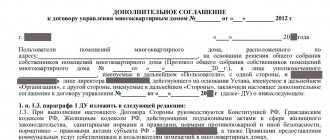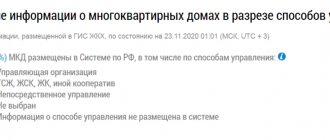What it is?
Direct management (DI) of an apartment building (MAB) is a method of managing the entire housing and communal structure, in which the management functions and provision of services are provided not by the management company, but exclusively by the initiative of the owners of residential premises.
With this method of managing an apartment building, all responsibility for the well-being of the house and the territories assigned to it falls on the shoulders of the initiative group or is distributed among all residents. Who exactly and to what extent will be responsible for management activities is decided at the general meeting of owners (GMS).
The legislative framework
The procedure and rules for the direct management of apartment buildings are regulated by the following laws and regulations:
- Minimum list of services and works dated April 3, 2013 No. 290.
- Decree of the Government of the Russian Federation on the rules of maintenance and provision of services dated April 3, 2013.
- Decree of the Government of the Russian Federation on the rules for managing apartment buildings dated May 15, 2013 No. 416.
- Article No. 164 of the Housing Code of the Russian Federation “On the direct management of apartment buildings by the owners of premises in such a house.”
Advantages and disadvantages
Direct management in general is not typical for Russia. Not only because this is a relatively new approach to managing housing and communal services, but also because of some shortcomings. Let's look at the pros and cons.
Pros:
- The opportunity for residents to fully control where and how the money they pay for home repairs and improvements goes.
With this form of management of an apartment building, there are no intermediaries: residents enter into contracts with contracting companies directly, which does not allow intermediary organizations to dispose of funds in bad faith. - If the owners are not satisfied with the services of contractors and resource supply organizations, they have the right to replace them at their own request. And there is no need to coordinate this with government agencies and the Criminal Code.
- All management issues are resolved at the general meeting. Each owner has the right to offer a solution to a particular problem that is beneficial in his opinion. This gives residents the feeling that the environment in which they live is fully in line with their wishes and interests.
- Residents can choose one responsible person to resolve all issues, who will conduct activities on behalf of the entire apartment building, reporting on the work done only to their own neighbors. You can also hire a third party who is not the owner of the living space in this apartment building if no one wants to take responsibility.
Minuses:
- Successful management of housing and communal services requires a high level of self-organization, which is not available to everyone. It is necessary to continuously monitor how RSOs and contractors perform their functions throughout the year.
- Due to the high responsibility, it is not easy to find a person who is ready to become an authorized person for the entire MKD. This activity takes a lot of time and is not paid, which is why almost no one agrees to such an unprofitable activity. The only way out in this situation is to agree that the residents themselves will collect money to pay the authorized person.
- To conclude an agreement on the provision of services or the supply of resources, the signature of each owner is required in all contracts. It is not easy to ensure that everyone pays money for utility bills on time.
- Maintaining documentation and reporting is not officially assigned to anyone, despite the presence of a single authorized person.
- Often, ordinary people, who are the owners, are not competent enough in choosing suppliers of resources and services. Therefore, the quality of execution may be unsatisfactory.
- By switching to NU, an apartment building loses support from the state. If major repairs of the building are needed, everything must be done at your own expense.
Nuances of direct control of MKD
An important stage in the implementation of direct services by residents of the house is the conclusion of contracts with the RSO. This is discussed in. The legal act stipulates how and in what quantities utilities are supplied from contractors if an agreement is reached with them on behalf of the owners under the direct management of the apartment building.
For interruptions in electricity, gas and water supply, it is the contractors or subcontractors with whom the contract is concluded that are responsible.
Direct management is characterized by a special relationship between residents and RSO. The agreement is concluded by each owner on his own behalf, the majority of persons as a single party or the owner of the apartment authorized for representation.
Direct service allows you to forget about problems with payment centers and. By involving contractors and ensuring the real activities of the house council, management will be as effective as possible. At the same time, funds for maintaining real estate are used more rationally.
If there are 100 or more apartments in an apartment building, direct management of an apartment building is not permissible. The number of residents in the house is proportional to the demands they receive regarding the maintenance of the apartment building. A huge number of additional tasks arise, the solution of which is quite difficult to control. The likelihood of reaching an agreement with all residents is too low. In such conditions, it is more expedient to create an HOA.
Conditions and requirements for switching to a NU apartment building
There are only 2 conditions that allow residents to transfer to independent management of an apartment building:
- The first is the actual desire to change the method of managing the MKD.
- The second is the organization of the OCC, followed by voting and entering the results into the protocol.
The only requirement for the transition to NU to take place is the need to get more than 50% of the owners’ votes for the transition.
What is the minimum and maximum number of apartments allowed?
By law, an apartment building has the right to switch to direct management if it has no more than 30 apartments. There is no minimum quantity established. Such a narrow scope of entry does not allow almost all standard houses that are higher than 4 floors to switch to NU. Therefore, today only small two- and three-story new buildings, as well as housing complexes of an above-average level, have the opportunity to change the way they manage housing and communal services.
Negative sides
- Difficulty in appointing a commissioner . It is problematic to find a volunteer to perform functions that are usually undertaken by the management company. Not everyone is ready to spend their personal time to solve problems and problems at home without paying a salary.
- Search for contractors . The person authorized by the residents has to independently select contractors to carry out repair work.
- Inability to participate in federal and municipal housing programs . The transition to direct economic activity makes it impossible to participate in government programs. That is, you will have to use your own resources and at the expense of funds collected from residents to improve the local area, install playgrounds, trash cans and benches.
- Resource supply organizations are responsible for supplying resources only up to a certain boundary, which is either the wall of a house or a common house meter. Residents are responsible for technical malfunctions of common property during the supply of heat, water, and electricity. Therefore, for its normal functioning, the owners are required to conclude an agreement with the service organization for the maintenance and repair of this property.
- Litigation . In the event of disputes with contractors or supply companies, all legal proceedings fall on the shoulders of the owners represented by an authorized representative.
- Distribution of debts between residents . Payment for the use of resources is calculated based on the readings of the common building meter and distributed among apartment owners. Conscientious payers have to pay the debts of defaulters. In court, bona fide residents can recover the amount of debt, and resource supply organizations will stop servicing the apartments of such debtors.
Implementation of the self-government method
Let's look at how to manage an apartment building yourself. According to article paragraph 3 of Art. 161 of the Housing Code of the Russian Federation, the method of managing an apartment building is determined at a general meeting of owners of premises in an apartment building and can be chosen and changed at any time based on its decision. The decision of the general meeting on choosing a management method is mandatory (what if the management method is not chosen or implemented?).
Creation of an initiative group
An initiative group is a group of people who have agreed to take on the responsibility of being intermediaries between other residents and contractors.
Their responsibilities also include monitoring timely payment for services, organizing general meetings of owners (GMS) and monitoring the quality of improvement. It is desirable that each entrance of the house have at least one representative in the initiative group.
How to attract neighbors?
The decision to change the method of managing an apartment building is made by a general vote of residents. For the transition to direct control to take place, it is necessary to obtain more than 50% of the total votes in favor. The decision is voluntary; the opinions of the owners can only be influenced by reasoned arguments in favor of the greater benefits of NU in comparison with. It is necessary to explain that no one will take care of the residents and their living conditions as much as they themselves.
An additional weighty argument is that no one will be able to pocket money for utilities if they are not given to third-party services.
Holding a meeting
One of the important points in the procedure for transferring to direct management of an apartment building is holding a meeting of residents. The decision on where and when the first meeting of residents should be held is made by the initiative group team. There are rules that must be followed. The group informs the owners of its decision, announcing who initiated the meeting, as well as indicating the date and time of the event. It is also mandatory to draw up a list of issues on the agenda.
The main issues discussed at the OOS:
- The feasibility of switching to NU. If, based on the voting results, it was decided to change the management method, move on to the next question.
- Selecting the person responsible for management. This person will conduct business and enter into agreements with the RSO.
- When the team has decided on a leader, it is necessary to select contractors who will provide utilities.
Drawing up a protocol
The verbal agreement of the residents has no legal force, therefore the decision to switch to NU is recorded. The protocol has a clear structure:
- Details of the protocol: name, date of the meeting, address of the house, type of meeting and form of voting (in person, in absentia).
- Introductory part. All participants are listed here: initiator, chairman, secretary, list of owners who take part. The total number of votes and the area of the house are also documented.
- Agenda. A list of issues to be discussed at the meeting is indicated. The items on the agenda in the minutes must correspond to the issues specified in the notice of participants about the meeting.
- Below is an indication of who spoke on what issue, what proposals were put forward, and what decisions were made on them.
- Attached to the protocol are appendices containing the register of delivery of invitations to the OSS, a register of all owners, a registration form for owners who participated in the OSS and other documents related to the meeting.
- Signature, full name and vote of each voting participant.
Procedure for concluding contracts
MKD is not an organization, that is, a legal entity. He cannot do business with contractors. And agreements on the provision of services have to be signed separately for each apartment. To avoid such inconvenience, all owners can write a power of attorney to the responsible person. Then it will be able to sign cooperation documents, representing the interests of all owners at once.
To conclude an agreement, the following documents are required:
- OSS protocol confirming that MKD wishes to switch to NU.
- A copy of the protocol indicating the responsible person.
- Technical passport of a residential building. You can provide a copy.
- Draw up an application for concluding agreements with RSO.
- Powers of attorney of apartment owners in the name of the authorized person who will sign the agreement.
Advantages and disadvantages
Direct control offers the following advantages :
- The ability to independently decide what to do with your property. Other forms assume that issues of carrying out repair work, distribution of finances and many others are resolved by the controlling organization.
- Availability of legal grounds for refusal of any public resource.
- Individual responsibility for relationships with resource supply organizations. That is, if one of the owners, for some reason, is unable to pay utility bills, then the shutdown of water, gas or heat supply will affect him.
- Savings on management, since apartment owners do not have to pay management companies or cooperatives.
Despite the large number of positive qualities, it is not without its drawbacks . Residents of the house who have chosen direct management have to independently cope with:
- repair work;
- landscaping the area and maintaining the house in good condition;
- management problems and periodically arising conflicts;
- lack of government funding for major repairs (accordingly, this type of management is unacceptable for the old housing stock);
- regular expenses for drawing up contracts with utility services and other companies (owners have to carry out insulation and preparation of the house for the cold season and other work at their own expense);
- problems and litigation with contractors;
- endless organizational issues.
How are responsibilities distributed among residents?
You can distribute responsibilities in two ways: verbally or officially by adding the relevant issue to the OSS agenda:
- The first method is based solely on the belief that duties, such as landscaping entrances and landscaping adjacent land, will be performed in good faith.
- The second option is preferable.
Responsibilities can be distributed either by voting or without it, by entering the conditions into the protocol, if none of the participants in the OSS objects. The protocol must specify who, according to what schedule, and what is doing to maintain the MKD in good condition.
Who pays for ODN and how?
General house needs (CHN) are charged by the resource supplying organization. In accordance with clause 44 of the “Rules for the provision of utility services to owners and users of premises in apartment buildings and residential buildings”, the positive volume of RPV is distributed among all apartments in the apartment building in proportion to the area of the residential premises.
According to paragraph 47 of the same law, the negative volume of one tax is calculated based on the number of people living in each apartment.
Features of NU
- There is no rent in the usual form; all payments are made directly to utility organizations.
- The debts of individual residents do not affect the other owners in any way.
- The responsibilities of service providers are distributed, each performing its own functions.
- Costs are significantly reduced due to the absence of intermediaries, management is carried out in-house.
- If there are social rented apartments in an apartment building, municipal employees are responsible for them at OSS.
- Residents can control their own utility costs; there is no risk of theft by intermediaries.
Kinds
The absence of intermediaries in the management of an apartment building assumes that residents will independently deal with :
- maintenance of general premises;
- reconstruction work and ongoing repairs;
- distribution of funds.
To make a decision on a particular issue, residents must organize a collective meeting . Voting can be either absentee or in-person. In the same way, it is possible to appoint a trustee, whose duty will be to represent the interests of the main number of residents in the house.
In accordance with Russian legislation, a HOA may include 1 residential building, several buildings or an entire block. This form of management requires that decisions are made at collective meetings, and the board is headed by a chairman.
Improvement of the adjacent territory and ongoing repairs are allowed either to be carried out independently or to enter into labor agreements with the relevant teams or contractors.
A housing cooperative is another form of management of an apartment building. The organization is an independent legal entity, consisting of a chairman and owners of real estate.
Among the features of such management are:
- permission or prohibition on renting common premises;
- individual rules for counting votes;
- regulatory legal acts do not contain any information regarding the procedure for such management, that is, the housing cooperative can come up with them themselves and include them in the Charter.
Russian laws state that apartment owners can independently choose and change the way they manage the building where they live. But, if they were unable to come to a consensus within 1 year, then the local government body will do it instead through an open competition.
Prospects for self-government
The prospects for NU MKD in Russia today do not inspire optimism. There are fewer and fewer houses with 30 or fewer apartments due to demolition programs for old housing. On the contrary, multi-storey buildings are being built in all major cities. Therefore, one should not expect the development of such a method of managing MKD.
The transition to NU has both positive and negative sides. It allows residents to feel free and protected from interference by officials and management companies. But they require increased awareness and understanding that the quality of life in apartment buildings depends only on the joint actions of residents.
The correct choice of the form of management of apartment buildings will help owners avoid many problems. We have prepared for you useful publications about such forms of management as housing cooperatives and homeowners' associations, as well as about what is better than housing cooperatives, HOAs or management companies and how the amount of payment for managing apartment buildings is determined.
Advantages and disadvantages
When a high-rise building is managed by a certain organization, it monitors engineering structures and is responsible for paying amounts for all services. The list of responsibilities of the management company includes maintaining all documentation, informing citizens about tariff changes, and distributing notifications. But with the direct method of controlling MKD, the situation is different.
Let's list the advantages of this option:
- The right to decide where to spend the collected money. If the house is managed by the management company, it spends the finances as stated in the contract.
- You can cancel a particular utility service.
- Issues regarding landscaping and reconstruction are resolved by homeowners collectively.
- Each of the owners living in the apartment building bears individual responsibility for the debts incurred for the apartment. If utility bills are not paid, restrictions on the supply of services will affect only the unscrupulous debtor.
- There is no need to deposit money to pay for the activities of the management organization. These functions are performed by apartment owners free of charge.
- If, in the case of an HOA or management company, the collected payments must be split (for utilities, the needs of the building), then the direct form of self-organization is characterized by the conclusion of a direct agreement with each company supplying the house with resources.
When choosing a direct control method, you should be guided not only by the advantages, but also be aware of the disadvantages.
The disadvantages are the following:
- You need to find an altruist from among the homeowners who will take responsibility and begin to deal with the problems of apartment buildings, documents, and contracts.
- You will have to organize landscaping and repair work yourself.
- There may be disagreements related to the distribution of collected funds.
- You cannot receive municipal funding for social projects. For example, you will have to build a ramp or equip a children's area at your own expense.
- The house cannot qualify for funds allocated by the city authorities for repairs.
- You will have to solve problems with unscrupulous contractors and conduct litigation on your own.
- Actions to improve, update common property and improve comfort are voluntary. If residents decide to install a video intercom or video surveillance, those who do not agree with this cannot be forced to participate in the financing of this event.
From an analysis of the advantages and disadvantages, we can conclude that direct control of MKD is not suitable for every building. This option will be optimal for a building with a small number of apartments, with good relations between neighbors.
It is important that each home owner has a stable financial position. If these conditions are not met, citizens risk many problems: from the inability to reach a common opinion to litigation in case of debt.








